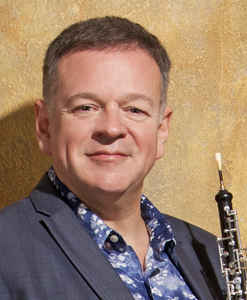|
Oboe |
Nicholas Daniel
has been acknowledged as one of the world’s great oboe players,
and is one of Nicholas
dedicates his life to music in many varied ways. He records and
broadcasts widely, including regular recordings on the Harmonia
Mundi Label, and he boasts a huge following internationally on
social media. He is proud to support and patronise many important
initiatives, charities and trusts, and has directed several music
festivals and concert series, most notably in Following his
BBC Proms conducting debut in 2004, he works with many fine
ensembles in wide-ranging repertoire ranging from Baroque to
contemporary, and from small groups to opera. He is Music Director
of Triorca, an orchestral project which brings together talented
young musicians from Over the last 18 months I have looked at what we do, and realised it’s more and more miraculous in a way. He says that when he listens to a musical performance, his first question is, “Is the person communicating. And are they communicating through themselves the feeling of the composer? People have different ways of approaching being a musician.” When he is the performer, “I try to use all of my experience in the various styles of music so that my playing will transmit what the composer is saying to me. To me, that means that I have to subjugate myself to an extent, but at the same time I have to allow, as it were, the harp strings of my self to resonate with the composer’s intentions, and then communicate that through my playing.” Like most of us, the life imposed by the pandemic has changed him. “Over the last 18 months I have looked at what we do, and realised it’s more and more miraculous in a way. It’s perhaps the most miraculous thing that human beings do – they make instruments, and then they communicate emotions to each other through them.”
|
|
|
|
